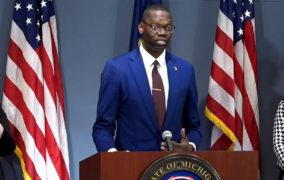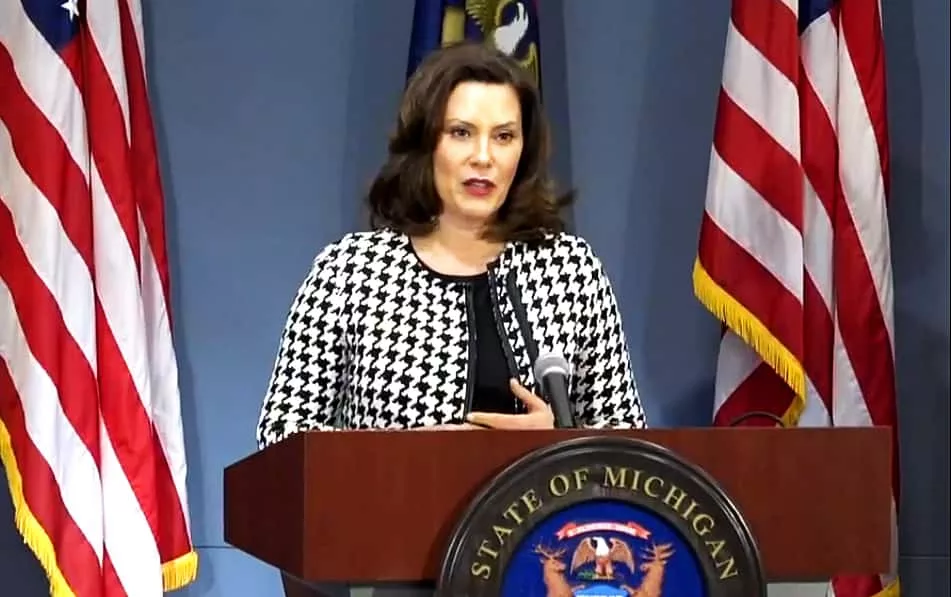Recognizing that the current coronavirus pandemic has disproportionately impacted communities of color throughout the state, Michigan Governor Gretchen Whitmer has established the Michigan Coronavirus Task Force on Racial Disparities.
Gov. Whitmer said this afternoon in her press conference update that while African Americans represent 13.6-percent of Michigan’s population, they represent a staggering 40-percent of the deaths from COVID-19. As a result, the newly appointed task force will act in an advisory capacity to the Governor and study the causes of racial disparities in the impact of COVID-19 and recommend actions to immediately address such disparities and the historical and systemic inequities that underlie them.
Whitmer says, “COVID-19 has taken a disproportionate toll on Michigan’s communities of color and I am confident this task force will help us identify the factors driving this disparity and to identify actions we can take to create a more equitable Michigan for everyone,” and adds, “Each of the task force members will provide a unique perspective and play a vital part in identifying these barriers and ensuring all Michiganders have equal access to critical resource when they need them most.”
Her Lt. Governor Garlin Gilchrist says, “We know that generations of racial disparities and inequality has a detrimental impact on the lives of people across the state,” and adds, “The coronavirus pandemic has shown this inequity to be particularly damaging, especially in the Black community, where the health of our friends and family has been disproportionately impacted. That’s why we are taking immediate action to assemble some of the greatest minds to tackle this racial injustice now and in the future.”
The task force will investigate the causes of racial disparities in the impact of COVID-19, recommend actions to address those disparities, and suggest ways to:
- Increase transparency in reporting data regarding the racial and ethnic impact of COVID-19.
- Remove barriers to accessing physical and mental health care.
- Reduce the impact of medical bias in testing and treatment.
- Mitigate environmental and infrastructure factors contributing to increased exposure during pandemics resulting in mortality.
- Develop and improve systems for supporting long-term economic recovery and physical and mental health care following a pandemic.
The task force will also work with different groups of community action stakeholders. Given the complexities of developing and implementing actions to address racial disparities, a diversity of stakeholders will provide valuable insights about how best to engage with the community, local government, and health systems.
The task force will also identify avenues of funding for combating racial disparities in the impact of COVID-19 and recommend changes in Michigan law relevant to combating racial disparities in the impact of and response to pandemics.
The Michigan Coronavirus Task Force on Racial Disparities will be chaired by Lieutenant Governor Garlin Gilchrist and include Department of Health and Human Services Director Robert Gordon or his designee, Chief Medical Executive Dr. Joneigh S. Khaldun, and the following members appointed by the Governor:
- Brandi Nicole Basket, D.O., of Clinton Township, is the chief medical officer for Meridian Health Plan Michigan Market.
- Matthew L. Boulton, M.D., of Ann Arbor, is the senior associate dean for Global Public Health and director of the Minority Health and Health Disparities International Research Training Program at the University of Michigan.
- Renée Branch Canady, Ph.D., of Lansing, is the chief executive officer of the Michigan Public Health Institute.
- Denise Brooks-Williams, of Detroit, is the senior vice president and chief executive officer of the Henry Ford Health System North Market.
- Dessa Nicole Cosma, of Detroit, is the executive director of Detroit Disability Power.
- Connie Dang, of Jenison, is the director of the Office of Multicultural Affairs and special assistant for Inclusive Community Outreach at Grand Valley State University.
- Marijata Daniel-Echols, Ph.D., of Farmington Hills, is the program officer at W.K. Kellogg Foundation.
- Debra Furr-Holden, Ph.D., of Flint, is an epidemiologist, the associate dean for Public Health Integration at Michigan State University, and the director of the Flint Center for Health Equity Solutions.
- Audrey E. Gregory, Ph.D., of Franklin, is the chief executive officer of the Detroit Medical Center.
- Whitney Griffin, of Detroit, is the director of Marketing and Communications for the Downtown Detroit Partnership.
- Bridget G. Hurd, of Southfield, is the senior director of Diversity and Inclusion at Blue Cross Blue Shield of Michigan.
- Curtis L. Ivery, Ph.D., of Detroit, is the chancellor of Wayne County Community College District.
- Solomon Kinloch Jr., of Oakland Township, is the senior pastor at Triumph Church in Detroit.
- Jametta Y. Lilly, of Detroit, is the chief executive officer of the Detroit Parent Network.
- Curtis Lipscomb, of Detroit, is the executive director of LGBT Detroit.
- Mona Makki, of Dearborn, is the director of the ACCESS Community Health and Research Center.
- Alycia R. Meriweather, of Detroit, is the deputy superintendent of the Detroit Public Schools Community District.
- Randolph Rasch, Ph.D., of East Lansing, is a professor and dean of the Michigan State University College of Nursing.
- Celeste Sanchez Lloyd, of Grand Rapids, is the community program manager for Strong Beginnings at Spectrum Health and a fellow in the W.K. Kellogg Foundation.
- Jamie Paul Stuck, of Scotts, is the Tribal Council chairman and member of the Nottawaseppi Huron Band of the Potawatomi Tribal Council.
- Maureen Taylor, of Detroit, is the state chair of the Michigan Welfare Rights Organization.
- LaChandra White, of Allen Park, is the director of the UAW Civil and Human Rights Department.
- Roy Wilson, M.D., of Detroit, is the president of Wayne State University.
The Task Force will continue its work until 90 days after the termination of the declared states of emergency and disaster, or such other time as the Governor identifies.
These appointments are not subject to the advice and consent of the Senate.
To view Executive Order 2020-55, click the link below:






